Inequality


In the past few months, the world has witnessed the worst outbreak of Ebola since the disease was first identified in 1976 — it has already claimed the lives of more than 3,400 people. But while the first cases in the U.S. and Spain have stirred fears over the past week, we don’t need to fear an unstoppable epidemic in developed countries. As World Bank President Jim Yong Kim aptly put it in a piece for the Huffington Post:
The knowledge and infrastructure to treat the sick and contain the virus exists in high- and middle-income counties. However, over many years, we have failed to make these things accessible to low-income people in Guinea, Liberia, and Sierra Leone. So now thousands of people in these countries are dying because, in the lottery of birth, they were born in the wrong place.
Dr. Kim makes the crucial point here — the current Ebola outbreak is much more than a public health crisis — it is an inequality crisis.

When churches conclude their summer hiatus and resume full-scale ministries this week, much will have changed from a year ago — outside their doors.
Conditions might have changed inside, too. But it is the world outside that demands fresh attention in mission and ministry.
Ferguson, Mo., has happened, revealing disturbing trends in law enforcement and deep fault lines between white experience and black experience.
Russia’s aggression against Ukraine happened, threatening a resumption of dangerous tensions between Moscow and Western democracies.
The Islamic State of Iraq and Syria happened, raising the dreaded specter of a take-no-prisoners war on modernity, reason, progress, women and other faiths.
The 113th Congress happened, mired in systemic dysfunction, with one party determined to cripple a black president and to channel more wealth to the wealthy.
The Koch brothers and their megabuck cronies happened, changing the face of electoral politics with unprecedented infusions of cash and ideological vitriol.
The two-tier economy happened, with one tier doing extraordinarily well and a much, much larger tier falling further behind, leaving despair among all age groups.
Border wars between terrified migrants and swaggering white men bearing arms against children happened, threatening America’s true core value as a welcoming nation promising freedom.
These outside-the-walls developments have little to do with the usual church fussing — except to say that it’s time for church people to stop their usual fussing.
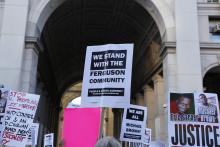
This week, I saw a torrent of debate about who reached for the gun and why police don’t shoot people in the leg rather than taking their lives. Neither angle seems to capture the bigger story at play on the evening news and fueling protest marches across Missouri.
On Sunday I preached to my church on race, current affairs and how to process — in a biblically loving way — what has been happening to brothers and sisters in Ferguson. (See video below) Talking about race and current affairs can be taboo in evangelical churches, and it was interesting as I saw a few couples exit the back door as I spoke.
Last week, I penned my thoughts on why we should pray for the saints in Ferguson. It was the outgrowth of my personal frustration and the pain I feel over the misunderstandings on race that can pervade the majority culture.
Race, Current Affairs & Prayer from Antioch Church on Vimeo.

While there are no biblical texts speaking directly to the issue of money in politics, biblical principles are still relevant, and people of faith have an important role to play in the emerging debate about the future of our democracy. Before exploring those principles, however, it is important to understand the serious issues of inequality currently present in our system, and the correlation between inequality and the money flooding our political system.
The richest 1 percent own more of the nation’s wealth than the bottom 90 percent. The richest one-tenth of one percent have as much pre-tax income as the bottom 120 million Americans.
In Affluence and Influence, political scientist Martin Gilens concludes that, “The preferences of the vast majority of Americans appear to have essentially no impact on which politics the government does or does not adapt.” He details the data throughout his book that clearly demonstrates policy makers are only listening to the wealthy donor class. This situation has been made even worse by the Supreme Court’sCitizens United in 2010, which allowed a huge influx of money to flood our political system after declaring the personhood of corporations.
The Court’s more recent decision in McCutcheon v FEC made matters even worse. Before McCutcheon, one person was able to contribute up to $123,000 to political candidates and parties. In striking down this aggregate limit, the Court paved the way for individuals to contribute more than $3.5 million directly to candidates and party committees. In a report detailing the potential impact of McCutcheon, Demos predicts the decision could result in more than $1 billion in additional campaign contributions by 2020.

In one of the screen-saved memories cataloged from my childhood, I sit in the living room, cross-legged, chin supported by two fists, staring up at moving pictures flashing across a small screen. On network television — because we didn’t have cable back then — Moses (aka Charlton Heston) led thousands of his people out of captivity. They just walked out of Egypt — streams of them. And then they reached the Red Sea.
The Egyptian army was at their back, pressing in. In that moment, though they had left captivity, freedom was not a done deal. They still had to cross over. They were still at war. They still had to outrun an army trained to kill or enslave them again.
Heston — I mean Moses — stood straight-backed on the bank of the Red Sea. He lifted his staff and put it down at the edge of the water, and a miracle took place in living rooms across America. The sea parted. I’ll never forget that moment. This moment was crafted before the digital era — before Disney’s Prince of Egypt, even before Star Wars, and yet it was still awe-inspiring. My eyes focused like lasers watching whole families cross a sea on foot.
Moses led. He was not a king. He was a foster child. He was not from the dominant culture. He was from an enslaved people. He was not a great orator. He stuttered, but he led anyway. He said “Yes” to God’s call and leaned into it. And because he did, the people were set free.

Does Jesus love African-American males? Then why aren’t we telling them so?!
I recently held a Town Hall Meeting at my church in my hometown of Madison, Wis., regarding the blaring racial disparity between whites and African Americans. This gathering attracted about 650 people who wanted to hear my thoughts after reading my "Justified Anger ” cover essay in a local newspaper. It appears that when one considers the economic, academic, arrest and incarceration disparities between African Americans and whites in Madison (and surrounding Dane County), there is no bleaker place for African Americans to be in the entire country than Madison. Although Madison — with its great university, beautiful lakes, bike paths, and educated residents — typically receives high marks as being among the best mid-sized American cities in which to live, it is now developing a different reputation about life here. Sadly, our community has been nationally deemed as ground zero for the disintegration of African-American males!
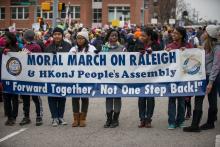
I believe that deep within our being is a longing for a moral compass. For those of us who are moved by the cries of our sisters and brothers, we know that, like justice, the acts of caring for the vulnerable, embracing the stranger, healing the sick, protecting workers, welcoming and being fair to all members of the human family, and educating all children should never be relegated to the margins of our social consciousness. These are not just policy issues; these are not issues for some left vs. right debate; these are the centerpieces of our deepest traditions of our faiths, of our values, of our sense of morality and righteousness.
We must remind those who make decisions regarding public policy what the prophet Isaiah said "Woe unto those who legislate evil ... Rob the poor of their rights ... make children and women their prey." Isaiah 10: 1-2
Martin Luther King, Jr. said 46 years ago in one of his last sermons that if you ignore the poor, one day the whole system will collapse and implode. The costs are too high if we don’t address systemic racism and poverty. It costs us our soul as a nation. Every time we fail to educate a child on the front side of life, it costs us on the back side — financially and morally.
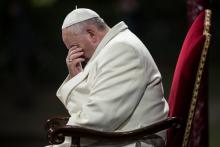
The latest dust-up about the unscripted words of Pope Francis came this week when he tweeted, in Latin, “Inequality is the root of social evil.” Conservative Catholics had their underwear in a bundle, nervously tweeting away about the dangers of addressing complex issues on Twitter, and warning about thinking that “redistribution” would solve global inequities. Some feared this was giving Thomas Piketty’s new popular book, Capital in the Twenty-First Century, more press. Liberal Catholics were delightfully surprised, once again, and argued that the pope was doing nothing more than putting Catholic social teaching into a tweet.
Inequality is the root of social evil.
— Pope Francis (@Pontifex) April 28, 2014But this latest interchange, happening of course between Catholics in the global “North,” misses the real point.
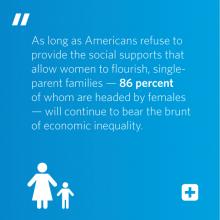
"Unmarried moms are rarer in America than France, Sweden, New Zealand, the UK, or the Netherlands" screams yesterday's headline by Matthew Yglesias on vox.com.
"And honestly, it's no big deal," sighs an exasperated Swiss friend of mine, weary of conservative American Facebook memes. Unmarried mothers apparently do just fine in Switzerland (though admittedly the Swiss rate of 20.2 percent of births to unmarried women is considerably lower than the American rate of 40.7 percent).
Actually, though, it is a big deal in the United States, for several reasons.

In the days before video games, we had tabletop games that were a lot of fun despite their built-in shortcomings. We had an electric football game with a vibrating field; sometimes, the players would go in circles or simply stop in place. There was a hockey game with long rods that were pushed and pulled to make players advance or retreat, then spun to make them whirl and shoot; occasionally, the puck would wind up in a dead space on the board.
At those moments, you had two choices: Call a timeout, or raise your legs a bit to tilt the table and get the player or the puck headed in the other direction.
Naturally, this was frowned upon. It was seen as cheating — giving yourself an advantage. If you got caught raising the table, you were penalized. A tilted table was considered unfair.
In real life, we all sit at tilted tables.
As the federal minimum wage stagnates at $7.25 an hour, many states have taken the lead to raise wages on their own. Where does your state stand?


Laying out a blueprint for the issues that are likely to define his papacy, Pope Francis on Tuesday issued a biting critique of capitalism, calling on world leaders to fight against poverty and for the rich to share their wealth, and urging the media to adjust its priorities.
“How can it be that it is not a news item when an elderly homeless person dies of exposure, but it is news when the stock market loses two points?” Francis asked in an 84-page “apostolic exhortation” that is widely seen as a road map for his papacy akin to a presidential State of the Union address.
“How can we continue to stand by when food is thrown away while people are starving?” he asked. “Today, everything comes under the laws of competition and the survival of the fittest, where the powerful feed upon the powerless. As a consequence, masses of people find themselves excluded and marginalized: without possibilities, without any means of escape.”

I watched 12 Years a Slave today. The film is based on Solomon Northup’s autobiography by that name. Northrup was a free black man living in Saratoga, N.Y. He was lured away from his home to Washington, D. C., on the promise of lucrative work and was kidnapped, transported to Louisiana, and sold into slavery. He was rescued 12 years later.
Some of the questions and issues that the movie raises are: What right do people have to own others? Do money and might make right? Unjust laws — such as slave laws — exist. It just goes to show that something can be legal, yet morally wrong. Still, laws come and go. We must not confuse laws with rights, which are universal and enduring truths that do not change. What is true and right and good is always so. So, too, that which is evil is always evil. Even if unjust laws are overturned and abolished, evil can still return in other guises.
I asked myself as I watched the movie, “Could it happen again?” Some of us may think, “Surely, something like this could never happen in our day.” And yet, people are abducted and sold into various forms of slavery here and abroad on a daily basis. Granted — people are not publicly bought and sold on the slave block in America today because of skin color; however, people are enslaved based on race and class divisions.
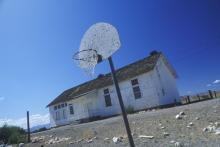
Most Americans share a common understanding that many public schools in poor neighborhoods aren’t great. It’s rare that I engage anyone who doesn’t know this basic fact on some level. But what’s less common is a deeper understanding of the extent of the problem. And sadly, even less common than that? Finding individuals who express a deep conviction that educational inequity can be eliminated. Faith communities are poised to add our voices to this much-needed conversation.
Fifteen million children live in poverty in the United States. Given poverty’s impact, many of these children already face additional challenges in their lives. For many young people, education can be “the great equalizer.” A high quality school can provide students with the necessary foundation to go to college and have a variety of opportunities opened to them. Poverty can become a thing of the past. But students growing up in poverty are more likely to attend low-performing public schools. In fact, only 22 percent of children who have lived in poverty do not graduate from high school. Only 9 percent receive college diplomas. And, not surprisingly, given our nation’s historical intersection of racial injustice and poverty, African American, Latino, and Native American students experience some of the nation’s biggest educational inequities.

I got a glimpse into the politics of scorn this week.
The visual was a photo accompanying a New York Times article on rental properties in Memphis, Tenn. The article itself seemed innocuous, about how foreclosed homes are being scooped up by outside investors and turned into rentals.
The photo, however, was troubling. It showed a young man lazing in a large chair while his two children stared numbly at a television screen and his wife tapped away on a cell phone.
I have no clue into this family’s character. But the visual screamed: “Idle! Lazy!”
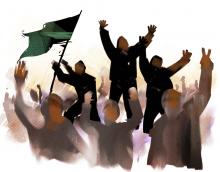
THE PHRASE “a revolution of rising expectations” is now part of the social science literature. When people who are not oppressed have a belief that life is getting better as economies improve, their expectations often outstrip the pace of actual change. Those rising expectations lead to unrest as demands for improvement continue to grow.
This summer we have seen that play out in several countries. As living standards increase, people are less likely to tolerate corrupt and inefficient governments. Washington Post reporters Anthony Faiola and Paula Moura recently wrote, “One small incident has ignited the fuse in societies that, linked by social media and years of improved living standards across the developing world, are now demanding more from their democracies and governments.”
In Turkey, it was the government’s plans to destroy the only public green space in the heart of Istanbul, a park that was to be replaced with a shopping mall. Protests against the plan soon grew into broader concerns about what is seen as increasingly authoritarian rule by Prime Minister Recep Tayyip Erdogan. They turned violent when peaceful demonstrators were attacked by police, and ultimately an Istanbul court ruled against the plan, although it is not finally settled.
In Brazil, protests that began over a proposed rise in bus fares brought hundreds of thousands of people into the streets. The protests soon escalated into opposition to the large amounts of money the government is investing in facilities for the 2014 World Cup and the 2016 Olympics, while neglecting basic health care and education. President Dilma Rousseff has promised political reforms and increased spending on public transportation and other social needs.

THOSE WHO BELIEVE in freedom and work for justice in our world sometimes grow nostalgic about the 1960s in this country, looking back at the leadership that emerged from African-American churches in the South, drawing allies from outside the region and beyond the bounds of creed. America has a vivid, living memory of faith inspiring public justice. But the civil rights movement did not just happen. The March on Washington and Selma were moments in history made possible by movements that grew out of hard work over the course of decades.
This summer in North Carolina, “Moral Mondays” at the state General Assembly have drawn thousands of weekly protesters, more than 800 of whom have been arrested for engaging in mass civil disobedience. A few weeks into the campaign, some elders started saying it felt like the ’60s all over again. The Washington Post highlighted NAACP state chapter president Rev. William Barber’s dynamic preaching. The New York Times pointed to the significance of hundreds of clergy uniting to lead the movement. MSNBC andFox News set up their satellite trucks. Week after week, thousands of people kept coming.
When reporters asked why, participants explained the concerns: 500,000 people denied health care when the legislature refused federal funds for Medicaid expansion, 70,000 people whose unemployment insurance was cut off, thousands of poor families denied an earned income tax credit, wholesale repeal of the hard-won Racial Justice Act, and diversion of public education funds through a voucher program. The reasons were legion, but they were not, by and large, unique to North Carolina. They were the sort of changes the American Legislative Exchange Council (ALEC) promotes at the state level throughout the country. How, then, did this grassroots resistance movement emerge in North Carolina?

The Parable of the Good Samaritan is one of the most well-known, beloved, and influential portions of the New Testament. As a striking narrative about care and compassion for others, the content of Luke 10:29-37 has reverberated throughout the centuries as a clear and profound call to public love through personal action. All together, the radical hospitality of the Samaritan has sparked various charitable acts and organizations around the world. Thus, one can argue that no other parable has offered a more profound impact on the course of human history.